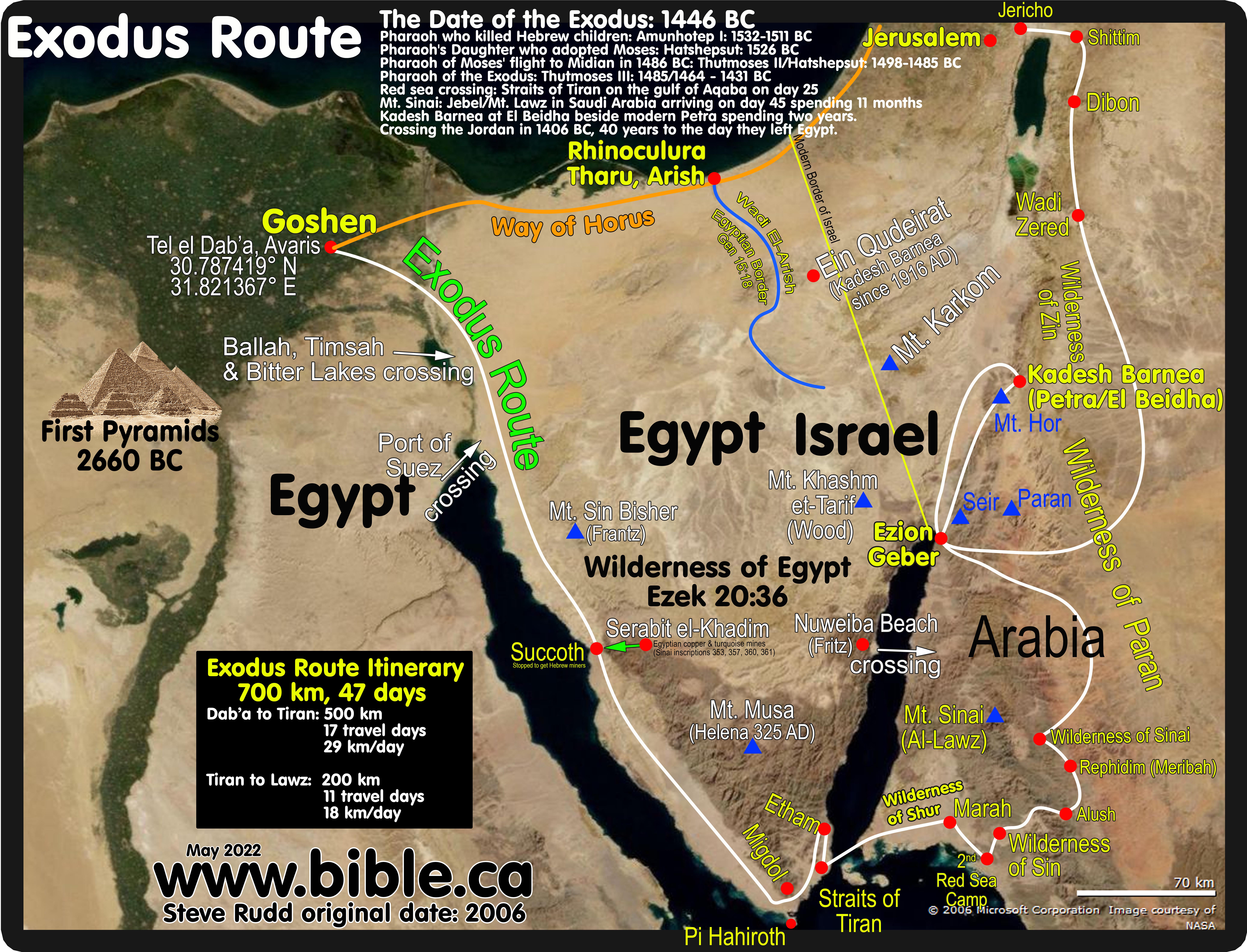The Exodus Route:
|
|
Wilderness of Etham |
|
Exodus locations:
|
Introduction:
1. There is are two Ethams in the Exodus route:
a. One before they crossed the Red Sea and the "wilderness of Etham" after they crossed.
2. There are a number of ways of viewing the wilderness of Etham:
a. It may be a textual gloss: Etham is not found in the LXX in Number 33:8. The Hebrew has no vowels and "Etham" is almost identical to "them". Perhaps the Masoretes erred when they added the vowelling. Many commentators completely ignore it in Num 33:8.
b. It may be derived from Egyptian word for wall/fortification. Hb. ��r = �wall� and Egyptian htm = �wall, fortress�. "wilderness of Etham Although identified as Shur in Exodus 15:22, this need not imply two versions. Etham is simply Egyptian for Hebrew Shur, both meaning �wall, fortification.�" (The JPS Torah Commentary: Numbers 33:8, 1999 AD)
c. It may simply mean there is a place called Etham on both sides of the Gulf of Aqaba at the straits of Tiran.
A. The one text that says, wilderness of Etham: Numbers 33:6-8
1. "They journeyed from Succoth and camped in Etham, which is on the edge of the wilderness. They journeyed from Etham and turned back to Pi-hahiroth, which faces Baal-zephon, and they camped before Migdol. They journeyed from before Hahiroth and passed through the midst of the sea into the wilderness; and they went three days' journey in the wilderness of Etham and camped at Marah." Numbers 33:6-8
2. The wilderness of Etham is in fact the same as the Wilderness of Shur.
B. Wilderness of Etham may be a copyist error and doesn't exist:
1. It is only found once in the Bible at: Numbers 33:8
2. Wilderness of Etham does not exist, but is a scribal gloss. It is not in the Septuagint (LXX), but in the Massoretic text.
3. Notice that Etham is a stop they made before crossing the Red Sea. After crossing it says they went into the Wilderness of Shur, then the Wilderness of Etham. "Then Moses led Israel from the Red Sea, and they went out into the wilderness of Shur; and they went three days in the wilderness and found no water." Exodus 15:22
4. The Hebrew has no vowels and "Etham" is almost identical to "them". Perhaps the Masoretes erred when they added the vowelling.
5. Numbers 33:8 should therefore read: "They journeyed from before Hahiroth and passed through the midst of the sea into the wilderness; and they went three days' journey in the wilderness [of Shur] all of them together and camped at Marah." Numbers 33:8
|
Exodus 15:22 |
Numbers
33:8 |
Numbers
33:8 |
|
"Then Moses led Israel from the Red Sea, and they went out into the wilderness of Shur; and they went three days in the wilderness and found no water." |
"They journeyed from before Hahiroth and passed through the midst of the sea into the wilderness [of Shur]; and they went three days' journey in the wilderness of Etham and camped at Marah." |
"They journeyed from before Hahiroth and passed through the midst of the sea into the wilderness; and they went three days' journey in the wilderness all of them together and camped at Marah." |
C. Discussion about the location of Mt. Sinai:
1. Some try to use the Wilderness of Etham as a reason why Mt. Sinai could not be Saudi Arabia. They try to butt the wilderness of Etham somewhere beside or near the town of Etham.
a. These people are unaware that the phrase "of Etham" is a textual gloss and not in the original Hebrew.
b. The Hebrew words for "Etham" and "all together" are very similar.
2. But even granting it is genuine text, and it may be, it really doesn't matter. All it means is there was place called Etham on both sides of the Gulf of Aqaba at the Straits of Tiran. It simply means that there was a place called Etham before they crossed the Red Sea and a second place called the "Wilderness of Etham" after they crossed.
3. Of course, it has completely escaped their notice that the Wilderness of Shur was in Midian in modern Saudi Arabia.
By Steve Rudd: Contact the author for comments, input or corrections.




